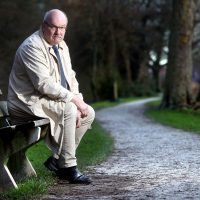Strategy Videos
Dap Hartmann watched four hardly seen videos about TU Delft’s strategy on YouTube. He noticed that they are full of empty statements and meaningless phrases, and wonders who on earth wrote them.
Dap Hartmann watched four hardly seen videos about TU Delft’s strategy on YouTube. He noticed that they are full of empty statements and meaningless phrases, and wonders who on earth wrote them.

(Photo: Sam Rentmeester)
Four videos about TU Delft’s strategy have been online on YouTube for five months now. I had no idea they were there, and apparently I’m not the only one as practically nobody has watched them. According to the TU Delft Facts and Figures’ website (as of December 2024), our university has 7,592 full-time equivalent (FTE) staff and 26,195 students. Yet, at the time of writing, these four videos have been viewed just 62 times in total. That’s nothing short of disappointing.
What is the underlying rationale behind these infantile videos whose style and patronizing tone strongly remind me of the educational television programmes we used to watch in primary school? Who are these TikTok-style video farts aimed at, and how much did this drivel cost?
Institutional Plan 2024-2030 lasts 99 seconds. With 26 views, it’s the most-watched of the four videos. It consists of a series of meaningless platitudes such as: ‘The new strategic agenda sets our course for 2030. With forward-looking initiatives and ideas, for a vital organisation in the long term.’ Equally uninspiring is: ‘We need to adapt to a shifting world view and deal with many developments.’ We should also ‘account for the unexpected’ which looks like a textbook contradiction to me.
The other three videos offer more or less the same empty rhetoric. Strategic Mission and Vision runs for 61 seconds and has 14 views. Strategic Agenda (67 seconds, 18 views) informs us that ‘The future, with all its uncertainties and developments, requires a vital university community’. Let that hollow phrase sink in for a moment. How do people even come up with this babble? By the way, it’s worth noting that the word ‘future’ is feminine in Dutch, meaning the sentence should be ‘The future, with all her uncertainties’. But who’s nitpicking? Guilty as charged.
Perhaps there was a private screening on a big screen with champagne and popcorn
The ultimate embarrassment is Dynamic Context and Ecosystem, which lasts 67 seconds and has a mere four views. That means that not even all the members of the Supervisory Board have watched it. At least, not on YouTube. Perhaps there was a private screening on a big screen with champagne and popcorn. I can just imagine the roaring ovation that followed this four minute and 54 second marathon display of clichés and buzzwords: strategic, forward-looking, vital, safe, engagement, societal connection, resilience, high-quality, sustainable, creative, innovative, responsible, groundbreaking, pioneering, human-centred, adapt, making an impact, building, flexible, future-proof, responding, improving.
How do the writers even come up with this stuff? Do they have a lottery machine that spits out three balls at a time containing such buzzwords which they then string together into sentences like: ‘Engineers who are creative, innovative and responsible and contribute to solving complex and urgent societal challenges. We do this in a groundbreaking, pioneering and human-centred way’.
I asked ChatGPT: ‘Create a short strategic agenda 2030 for TU Delft, filled with hollow phrases and clichés. The result was indistinguishable from the official formulations found in inflated strategic documents such as the Strategic Agenda 2024-2030, the Strategic Priorities 2022-2024, and, of course, the Strategic Framework 2018-2024.
You’d almost think … but no … surely not …?
Dap Hartmann is Associate Professor of Innovation and Entrepreneurship at the Delft Centre for Entrepreneurship (DCE) at the Faculty of Technology, Policy and Management. In a previous life, he was an astronomer and worked at the Harvard-Smithsonian Center for Astrophysics. Together with conductor and composer Reinbert de Leeuw, he wrote a book about modern (classical) music.
Comments are closed.